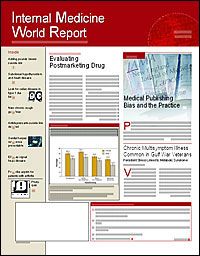ED May Signal Heart Disease in Older Men
Men who have erectile dysfunction (ED) have twice the risk of developing a cardiovascular (CV) event as their peers without ED, according to the first study to establish a strong relationship between ED and future CV events (JAMA. 2005;294: 2996-3002).
Researchers culled data from the placebo arm of the prospective, blinded, controlled Prostate Cancer Prevention Trial, which randomized 18,882 men, aged >=55 years, to either placebo or finasteride (Proscar).
Among the 9457 men in the placebo group, 8063 did not have CV disease when the study began. In this latter group, 3816 had a history of ED before entering the study. Of the remaining 4247 men without CV disease or ED, 2420 (57%) reported incident ED (ie, first ED event) at 5 years' follow-up, and 2760 (65%) had incident ED after 7 years.
Incident ED had a significant relationship with subsequent CV events, regardless of potential confounders (Table).
For men who did not have ED at baseline but who had incident ED during the study, 2% had a first CV event 1 year after the first report of ED, and 11% had a first CV event 5 years after the first report of ED. When comparing men who did not have ED with those who did when the study began, the unadjusted risk of a first CV event was 0.015 per person-year in the former group and 0.024 per person-year in the latter.
Key points
>10 million American men have ED.
50% of men who die of CV disease have no history of the disease.
ED at age ?55 increases risk of first CV event by about 2-fold.
Screen any man presenting with ED for CV risk factors.
To further illustrate the association, the investigators conducted a multivariate assessment of traditional CV risk factors for men without ED at baseline. Incident "ED had an equal or greater effect on subsequent cardiovascular events of the same magnitude as a family history of myocardial infarction, cigarette smoking, or measures of hyperlipidemia," wrote Ian M. Thompson, MD, of the University of Texas Health Science Center at San Antonio, and colleagues.
"The implications of this study are substantial," they emphasized, noting that the availability of effective pharmacotherapy for ED has prompted more men to seek care. "With 70% to 89% of sudden cardiac deaths occurring in men?the initial presentation of a man with [ED] should prompt the evaluating physician to screen for standard cardiovascular risk factors and, as appropriate, initiate cardioprotective interventions."
